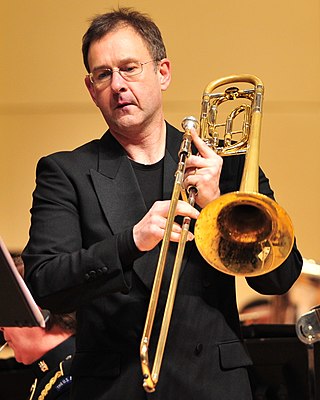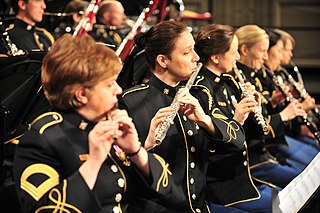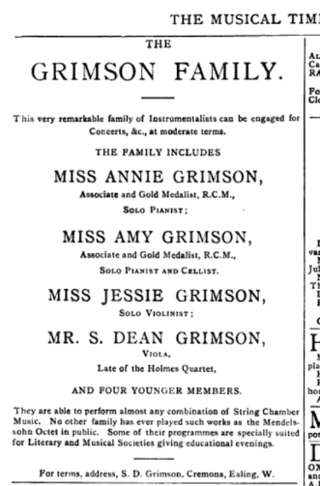Related Research Articles

A musical ensemble, also known as a music group, musical group, or a band is a group of people who perform instrumental and/or vocal music, with the ensemble typically known by a distinct name. Some music ensembles consist solely of instrumentalists, such as the jazz quartet or the orchestra. Other music ensembles consist solely of singers, such as choirs and doo-wop groups. In both popular music and classical music, there are ensembles in which both instrumentalists and singers perform, such as the rock band or the Baroque chamber group for basso continuo and one or more singers. In classical music, trios or quartets either blend the sounds of musical instrument families or group instruments from the same instrument family, such as string ensembles or wind ensembles. Some ensembles blend the sounds of a variety of instrument families, such as the orchestra, which uses a string section, brass instruments, woodwinds, and percussion instruments, or the concert band, which uses brass, woodwinds, and percussion. In jazz ensembles or combos, the instruments typically include wind instruments, one or two chordal "comping" instruments, a bass instrument, and a drummer or percussionist. Jazz ensembles may be solely instrumental, or they may consist of a group of instruments accompanying one or more singers. In rock and pop ensembles, usually called rock bands or pop bands, there are usually guitars and keyboards, one or more singers, and a rhythm section made up of a bass guitar and drum kit.

A concert band, also called a wind band, wind ensemble, wind symphony, wind orchestra, symphonic band, the symphonic winds, or symphonic wind ensemble, is a performing ensemble consisting of members of the woodwind, brass, and percussion families of instruments, and occasionally including the harp, double bass, or bass guitar. On rare occasions, additional, non-traditional instruments may be added to such ensembles such as piano, synthesizer, or electric guitar.

Frederick Joseph Ricketts was an English composer of marches for band. Under the pen name Kenneth J. Alford, he composed marches which are considered to be great examples of the art. He was a Bandmaster in the British Army, and Royal Marines Director of Music. Conductor Sir Vivian Dunn called Ricketts "The British March King". Ricketts' frequent use of the saxophone contributed to its permanent inclusion in military bands. His best known work is the "Colonel Bogey March".
Gordon Percival Septimus Jacob CBE was an English composer and teacher. He was a professor at the Royal College of Music in London from 1924 until his retirement in 1966, and published four books and many articles about music. As a composer he was prolific: the list of his works totals more than 700, mostly compositions of his own, but a substantial minority of orchestrations and arrangements of other composers' works. Those whose music he orchestrated range from William Byrd to Edward Elgar to Noël Coward.
Serenade to Music is an orchestral concert work completed in 1938 by English composer Ralph Vaughan Williams, written as a tribute to conductor Sir Henry Wood. It features an orchestra and 16 vocal soloists, with lyrics adapted from the discussion about music and the music of the spheres from Act V, Scene I from the play The Merchant of Venice by William Shakespeare. Vaughan Williams later arranged the piece into versions for chorus and orchestra and solo violin and orchestra.

Ian Bousfield is an English musician who has held positions as Principal Trombone with the Vienna Philharmonic Orchestra, the London Symphony Orchestra and the Hallé Orchestra. Also a pedagogue, Bousfield is an instructor in the music division at the Hochschule der Künste in Bern, Switzerland.
English Folk Song Suite is one of English composer Ralph Vaughan Williams' most famous works. It was first published for the military band as Folk Song Suite and its premiere was given at Kneller Hall on 4 July 1923, conducted by Lt Hector Adkins. The piece was then arranged for full orchestra in 1924 by Vaughan Williams' student Gordon Jacob and published as English Folk Song Suite. The piece was later arranged for British-style brass band in 1956 by Frank Wright and published as English Folk Songs Suite. All three versions were published by Boosey & Hawkes; note the use of three different titles for the three different versions. The suite uses the melodies of nine English folk songs, six of which were drawn from the collection made by Vaughan Williams' friend and colleague Cecil Sharp.

Crown Imperial is an orchestral march by William Walton, commissioned for the coronation of King George VI in Westminster Abbey in 1937. It is in the Pomp and Circumstance tradition, with a brisk opening contrasting with a broad middle section, leading to a resounding conclusion. The work has been heard at subsequent state occasions in the Abbey: the coronation of Queen Elizabeth II in 1953, the wedding of Prince William in 2011 and the coronation of King Charles III in 2023. It has been recorded in its original orchestral form and in arrangements for organ, military band and brass band.

The Royal Marines Band Service is the musical wing of the Royal Navy and an independent element of the Royal Marines. It currently consists of five bands plus a training wing – the Royal Marines School of Music at HMS Nelson – and its headquarters is at HMS Excellent, Whale Island, Portsmouth.
"Follow the Colours" is a marching song written by the English composer Edward Elgar in 1907, with words by Capt. William de Courcy Stretton. The song is for male voice solo with an optional male voice chorus, accompanied by piano, orchestra or military band.
Winterbottom is a surname. Notable people with the surname include:

The Royal Artillery Mounted Band was a British military band consisting of woodwind, brass, and percussion instruments, and military unit, founded in 1886, and in existence until 1984, representing the Royal Artillery, and the Royal Horse Artillery, and augmenting the Royal Artillery Band at royal and state occasions.

The Royal Artillery Band was the first official, and permanent British military band originating in 1557, but granted official status in 1762. Consisting of woodwind, brass, and percussion instruments, it represented both the Royal Regiment of Artillery, and the state. The Royal Artillery Orchestra [disbanded on 9 February 2014] was Britain's first permanent professional orchestra. All other bands in the British Army received official, permanent status from 1763 onward. Now that the band's overall history of over four and a half centuries has come to an end, it is now claimed that the Band of the Grenadier Guards are the oldest band, with their overall history of over three hundred and thirty years. It is however, important to consider that until 1762, all military bands were formed as and when required, and then immediately disbanded when not, and that they consisted only of hired, civilian musicians; becoming integrated professional soldiers in 1762 and from 1763.

The woodwind section, which consists of woodwind instruments, is one of the main sections of an orchestra or concert band. Woodwind sections contain instruments given Hornbostel-Sachs classifications of 421 and 422, but exclude 423

Michael Rath Trombones is a British manufacturer of retail and custom hand-made trombones. Rath offers artist-quality and student instruments in its line of tenor, bass, contrabass and alto trombones. Rath Trombones was founded in 1996 by instrument technician Michael Rath, and is Britain's only trombone manufacturer. Rath's 12 craftspeople create as many as 500 trombones per year, exporting instruments through 25 distributors in North and South America, Japan, Europe, Australia, New Zealand, Singapore and Taiwan.
Raise the Roof is a one-movement concerto for timpani and orchestra by the American composer Michael Daugherty. The work was commissioned by the Detroit Symphony Orchestra for the opening of the Max M. Fisher Music Center. It was premiered in Detroit, October 16, 2003, with conductor Neeme Järvi leading the Detroit Symphony Orchestra and timpanist Brian Jones. Daugherty later arranged the piece for concert band in 2007; this arrangement was commissioned by the University of Michigan Symphony Band and was premiered under conductor Michael Haithcock at the National Conference of the College Band Directors National Association on March 30, 2007. Raise the Roof is one of Daugherty's most-programmed pieces and has been frequently performed as a concert opener since its publication.

The Music of the Foreign Legion, formerly known as the Principal Music of the Foreign Legion is a Military band of the French Foreign Legion.

Maisie Ringham MBE, later Maisie Ringham-Wiggins, was a British musician. She was the first woman to be a principal trombonist in a British orchestra.

The Grimson family was a family of classical musicians active in London from the early 1870s.
References
- 1 2 3 'A Notable Family: The Winterbottoms', in The Cornishman, 26 February 1903), p. 3
- ↑ 'Mr Frank Winterbottom: Farewell Concert by Combined Bands', in The Western Morning News, 22 September 1910, p. 5
- 1 2 Peter Gammon. The Oxford Companion to Popular Music (1991), pp. 613-14
- ↑ 'John Winterbottom', Yeoman Warder's website
- 1 2 3 4 Henry George Farmer. 'Staff Bandmasters', in The Rise & Development of Military Music (1912), p. 149
- ↑ 'Winterbottom, William/Arranger' at IMSLP
- ↑ 'Mr. Winterbottom's Concert', in The Argus, 15 March 1853, p. 7
- ↑ James Duff Brown, Stephen Samuel Stratton. British Musical Biography (1897), p. 454
- 1 2 'Obituary', Yorkshire Post and Leeds Intelligencer, 27 January 1930, p. 2